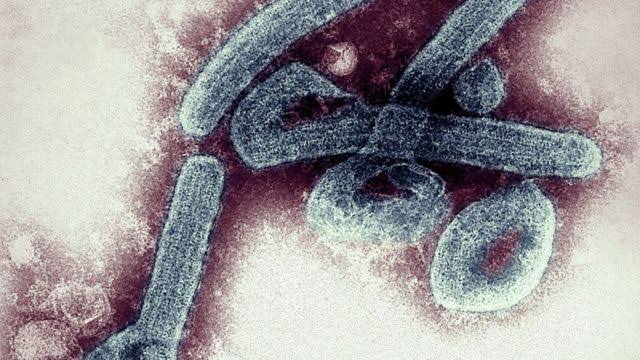Headline
Hospital Notifies Against ‘Outbreak Of New Virus In Nigeria

Hospital Notifies Against ‘Outbreak Of New Virus In Nigeria
Few weeks after the World Health Organisation confirmed an outbreak of Marburg virus in neighbouring Ghana, a Nigerian hospital has notified the hospital community ‘of an outbreak’ of the virus.
Marburg is a highly infectious disease that is said to be in the same family as the virus that causes Ebola.
In a leaked internal memo on Friday, the University of Abuja Teaching Hospital, Gwagwalada, notified the hospital community of the outbreak of the virus and called for caution.
The memo, which was signed by the Deputy Director in charge of the hospital’s information unit, Sani Suleiman, was addressed to the staff and heads of various departments in the health facility.
Mr Suleiman confirmed the authenticity of the memo in a telephone interview with PREMIUM TIMES on Sunday but said there was no cause for alarm.
The memo, which was titled; “Outbreak of Marburg Disease and COVID-19 Infections,” reads in part; “The Management of University of Abuja Teaching Hospital wishes to notify the entire hospital community of an outbreak of Marbug (sic) disease and upsurge in COVID-19 infection.
“Consequently, the attention of all Head of Departments and members of staff is hereby drawn to ensure adequate surveillance and hygiene by observing all protocols of prevention.”
The memo also warned of increasing cases of coronavirus infections and advised the workers against letting down the guards.
It added; “More details will be sent on our various social media platforms on the outbreak in due course…”
In July, the Ghana Health Service (GHS) confirmed the first two cases of the Marburg virus disease.
The development came after a preliminary finding of the cases from the Ashanti Region earlier in July by the country’s Noguchi Memorial Institute for Medical Research.
The results were reportedly sent to the Institut Pasteur in Dakar (IPD), Senegal, with support from the World Health Organisation (WHO) where they were confirmed to be the Marburg virus.
“The two patients from the southern Ashanti region – both deceased and unrelated – showed symptoms including diarrhoea, fever, nausea and vomiting. They had been taken to a district hospital in Ashanti region,” the WHO had disclosed in the preliminary report.
The GHS head, Patrick Kuma-Aboagye, said 98 people identified as contact cases were then placed under quarantine, adding that “this is the first time Ghana has confirmed Marburg virus disease.”
Confirming the development, the WHO regional director for Africa, Matshidiso Moeti, said health authorities responded swiftly, “getting a headstart preparing for a possible outbreak.”
Nigeria’s guidelines
Though the Nigeria Centre for Disease Control (NCDC) is yet to react to the latest development, it earlier in July issued guidelines aimed at guiding the public on preventive measures.
NCDC said it was on a high alert following the Ghanaian experience.
The NCDC director-general, Ifedayo Adetifa, said in the statement that no case of Marburg virus has been reported in Nigeria but that several measures were being put in place to prevent its outbreak
The outbreak in Ghana was the second time the virus would be detected in West Africa, after the 2021 experience in Guinea.
Mr Adetifa said following the proximity of Ghana to Nigeria as well as the WHO alert, the NCDC-led multisectoral National Emerging Viral Haemorrhagic Diseases Working Group (EVHDWG) has conducted a rapid risk assessment to guide in-country preparedness activities.
The NCDC boss also noted that Nigeria has the capacity to test for the virus presently at the National Reference Laboratory in Abuja and the University of Lagos Teaching Hospital Laboratory Centre for Human and Zoonotic Virology.
“Diagnostic capacity can be scaled up to other laboratories if required. Nigeria has the resources (human, technical and laboratory) for prompt identification and management in the event of a single imported case,” he added.
Mr Adetifa assured that the risk of importation may be further reduced as the current situation in Ghana is under control and active case finding is ongoing while there is heightened surveillance in Togo and Benin.
He also disclosed that “many of the contacts under follow-up in Ghana will soon exit the 21-day quarantine period and so far, there have been no secondary cases reported.”
Preventive measures
To prevent the outbreak of the virus in Nigeria, the NCDC highlighted measures that Nigerians should adhere to.
It urged Nigerians to avoid non-essential travel to locations where the outbreak is reported, and avoid direct contact with blood, saliva, vomit, urine, and other bodily fluids of people suspected or confirmed to have the virus.
Other measures announced by the NCDC are:
“Ensure all persons with the symptoms described above are promptly taken to healthcare facilities for diagnosis and initiation of supportive treatment.
“In suspected and/or confirmed MVD cases, direct physical contact should be avoided by ensuring strict isolation, the use of protective gowns, masks, gloves and safe disposal of needles, bedding, and other contaminated materials.
“Strict practice of infection prevention control in the healthcare setting for all suspected patients.”
Briefly About Marburg Virus Disease (MVD)
The Marburg virus causes a rare, highly infectious viral hemorrhagic fever and is in the same family as Ebola, both members of the Filoviridae family (filovirus).
Marburg is transmitted to people from fruit bats as a result of prolonged exposure to mines and caves that have Rousettus bat colonies. It is not an airborne disease.
The virus spreads through human-to-human transmission via direct contact with the blood, secretions, organs or other bodily fluids of infected people, and with surfaces and materials contaminated with these fluids.
NCDC said; “The initial symptoms of the disease include sudden onset of high fever, chills, headache, body aches which may be accompanied by a rash, most prominent on the chest, back and stomach, nausea/vomiting, chest pain, sore throat, abdominal pain by the fifth day of illness.
“Increase in severity of the illness can be heralded by the appearance of severe watery diarrhoea, jaundice, inflammation of the pancreas, severe weight loss, bleeding from multiple areas, delirium, shock, liver failure, massive haemorrhaging, and multi-organ dysfunction and/or failure.
“In fatal cases, death occurs often between 8 and 9 days after symptom onset. The case fatality rate for MVD is estimated to be 24 to 88 per cent.”
It added that the Marburg virus is known to persist in the body – placenta, amniotic fluid, the fetus of infected pregnant women, breast milk of women who were infected while breastfeeding and semen – of persons who have recovered from MVD.
-

 Headline1 week ago
Headline1 week agoCAF Approves 28-Man Squads For 2025 AFCON, See Full List
-

 Brands and Marketing1 week ago
Brands and Marketing1 week agoSee Dollar To Naira Exchange Rate Today, November 28, 2025
-

 Entertainment7 days ago
Entertainment7 days agoBurna Boy’s ‘No Sign Of Weakness’ U.S. Tour Dates Cancelled, See Why
-

 Crime1 week ago
Crime1 week agoUK Rejects Nigeria’s Request To Transfer Ekweremadu’s Prison Sentence, See Why
-

 Headline1 week ago
Headline1 week agoJUST IN: Tinubu Finally Appoints Ambassadors, See Full List
-

 Headline1 week ago
Headline1 week agoBREAKING: El-Rufai Officially Joins ADC— Reports
-

 Education1 week ago
Education1 week agoJUST IN: ASUU Alongside NEC Set To Review FG’s Negotiation, See Date
-

 Headline1 week ago
Headline1 week agoBREAKING: 24 Kebbi Schoolgirls Kidnapped Regain Freedom
-

 Headline1 week ago
Headline1 week agoBREAKING: Islamic Scholar Sheikh Dahiru Is Dead, See Details Of Burial
-

 Brands and Marketing3 days ago
Brands and Marketing3 days agoUPDATED: See Naira To Dollar Exchange Rate Today





















